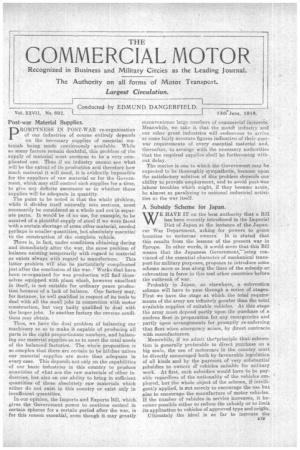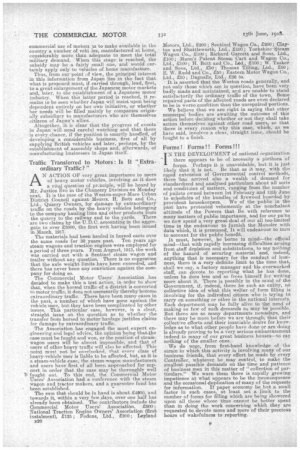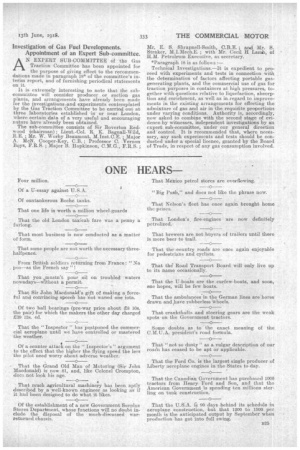Post-war Material Supplies.
Page 1

Page 2

Page 3

If you've noticed an error in this article please click here to report it so we can fix it.
pROMPTNESS IN POST-WAR re-organization Of our industries of course entirely depends on the necessary supplies of essential materials being made continuously available. While so many factors remain doubtful, this problem of the supply of material "must continue to be a very complicated one. Thus if an industry cannot see what will be the extent of its production and therefore how much material it will need, it is evidently impossible for the suppliers of raw material or for the Government, which may still control such supplies for a time, -to give any definite assurance as to whether those supplies Will be adequate in quantity.
The point to be noted is that the whole pioblem, while it divides itself naturally into sections, must necessarily be considered as a whole and not in separate parts. It would be of no use, for, example, to be assured of a plentiful supply of steel if we were faced with a certain shortage of some other material, needed perhaps in smaller qUantities, but absolutely essential' to the construction of the complete vehicle.
There is, in fact, under conditions obtaining during and inamediately after the war, the same problem of balance existing temporarily with regard to material as exists adways with regard to manufacture. This latter problem will also be particularly complicated just after the conclusion of the war. Works that have been re-organized for war production will find themselves equipped with plant which, however excellent in itself, is not suitable for ordinary peace production because of a lack of balance. One factory may for instance, be well qualified in respect of its tools to deal with all the small jobs in connection with motor construction, but very badly qualified to"deal with the larger jobs. In another factory the reverse conditions may obtain.
Thus, we have the dual problem of balancing our machinery so as to make it capable of producing all parts in the right proportionate numbers, and balancing our material supplies so as to meet the total needs of the balanced factories. The whole proposition is so complex that. there are certain to be hitches unless our material supplies are more than adequate in every case. This depends not only on the capabilities of our basic industries in this country to produce quantities of what are the raw materials of other industries, but also on our ability to bring in sufficient quantities of those absolutely raw materials which either do not exist in this country or exist only in insufficient quantities.
In our opinion, the Imports and Exports Bill, which, gives the Government power to continue control in , certain spheres for a certain period after the war, is for this reason essential, even though it may greatly Inconvenience large numbers of, commercial interesti • Meanwhile, we take it that the mot:if' industry and our other great industries will endeavour to arrive at some fairly accurate figures indicative of their post, war requirements of every essential material and, thereafter, to arrange with the necessary authorities that the required supplieWshall be forthcoming without delay.
The matter is one to which the overnment.may be expected to be'thoroughly sympathetic, because upon the satisfactory solution of this problem depends our ability to provide employment, and to avoid post-war labour troubles which might, if they became acute,' be almost as paralysing to national industrial activities as the war itself..
A .Subsidy Scheme for Japan.
E HAVE IT on the best authority that a Bill has been recently introduced in the Imperial
Diet of Japan at the instance of the Japanese War Department, asking for powers to grant bounties to Motorcar owners. It is stated that this results from the lessons of the present war in Europe. In other words, it would seem that this' Rill means that the Japanese Government,-Theing Convinced of the essential character of mechanical transport for military purposes, proposes to introduce some scheme more or less along the lines of the subsidy or subvention in force in this and other countries-before the outbreak of war.
Probably in Japan, as elsewhere, a subvention scheme will have to 'pass through a series of stages. First we have the stage at which, th& total requirements of the army are infinitely greater than the total available supplies of suitable vehicles. At this stage the army must depend partly upon the purchase of a nucleus fleet in preparation for any emergencies and partly upon arrangements for promptly re-enforcing that fleet when emergency arises, by Oirect contracts with manufacturers.
'Meanwhile, if we admit' the('principle that: subvention is generally preferable to direct purchase on. a big scale, the use of motorcars in the country must be directly encouraged both by favourable legislation ,of all kinds and by the payment of very substantial subsidies to owners a vehicles suitable for military work: At first, such subsidies would have to be payable regardless of the nationality of the vehicles employed, but the whole object of the scheme, if intelligently applied, is rrot merely to encourage the 'use but also to encourage the manufacture .of motor vehicles. If the number of vehicles in service increases, it be-comes-possible either to reduce the ubsiely or to limit its application to vehicles of approved type and origin.
Ultimately the ideal is so far to increase the commercial use of motors is to make available in the country a number of vehi lee, manufactured at home, considerably more than adequate to meet the total military demand. When this stage is reached, the subsidy may be a fairly small one, and would certainly apply only to vehicles of home manufacture.
Thus, from our point i'J view, the principal interest in this information from Japan lies in the fact that what is proposed must, if carried through, lead, first, to a great enlargement of the Japanese motor markets and, later, to the establishment of a-Japanese motor industry. When this latter period is reached, it remains to be seen whether Japan will insist upon being
• dependent entirely on her own initiative, or whether her needs will be filled mainly by companies originally subsidiary to manufacturers who are themselves citizens of Japan's allies. , Altogether, it is clear that the progress of events in Japan will need careful watching and that there is every chance, if the position is smartly handled, of developing a considerable business, first of all by supplying British vehicles and later, perhaps, by the -establishment of assembly shops and, afterwards, of manufacturing businesses in Japan itself.
Traffic Transferred to Motors: Is It "Extra ordinary Traffic?" '
AN ACTION OF very great importance to users of heavy motor vehicles, involving as it does a vital question of principle, will be heard by Mr. Justice Eve in the Chancery Division on Monday next. It is the case of the Weston-super-Mare Urban District Council against Messrs. H. Butt and Co., Ltd. Quarry Owners, for damage by extraordinarY trade on the roads lry the heavy vehicles belonging to the company hauling lime and other products from the quarry to the railway and to the yards. There are two claims by the U.D.C. amounting in the aggregate to over 23000, the first writ having been issued in March, 1917.
The materials had been hauled in horsed -carts over the same roads for 30 years past. Ten years ago steam wagons and traction engines were employed for a period of three years. From August, 1913, the work was carried out with a Sentinel steam wagon and trailer without any question. There is no suggestion that the axle weight limits have been exceeded, and there has never been any conviction against the company for doing so.
The Commercial Motor -Users' Association has decilded to make this a test action, in order to show that, when the horsed traffic of a district is converted in motor traffic, it does not necessarily thereby become extraordinary traffic. There have been many cases in the past, a number, of which have gone against the vehicle user, but they have been complicated by other issues. This particular case, however, is a clear, straight issue on the question as to whether the transfer from horsed to motor haulage justifies claims for damage by extraordinary traffic.
The Association has engaged the most expert engineering and legal advice, the opinion being that the case must be fought and won, or the position of steamwagon users will be almost impossible, and that of users of other heavy traffic will also be affected. This !mint must not be overlooked, that every class of heavy-vehicle user is liable to be affected, but, as it is a steam-vehicle case, the steam-wagon manufacturers and users have first of all been approached for support in order that. the case may be thoroughly well I■ fought out. To this end, the Commercial Motor Users' Association had a conference with the stearn wagon and tractor makers, and a guarantee fund has been established. ""'
The sum that should be in hand is about 24400, and towarcle it, within a very.few _clays, over one half has
already been obtained. The contributors include the Commercial Motor Users'. Association, £500; National Traction Engine Owners' Association (first instalment), £125; Fodens, Ltd., £200; Leyland n20
Motors, Ltd., £200; Sentinel Wagon Co., 2200; Clayton and Shuttleworth, Ltd., 2100 Yorkshire team Wagon Co., £100; Richard Garrett and Sons, Ltd., £100; Mann's Patent Steam Cart and Wagon Co., Ltd., £100; H. Butt and Co., Led., £100; W. Tacker and Sons, Ltd., e503 Thomas Tilling, Ltd., £50; E. W. Rudd and Co., 50; Eastern Motor Wagon Co., Ltd., £50; Da,gnalls, Ltd., 226 5s.
It is asserted that the Weston roads generally, and not only those which are in question, have been very badly made and maintained, and are unable to stand satisfactorily the ordinary traffic, of the town. Some repaired parts of the affected roads are even declared to be in worse condition than the unrepaire,d portions.
We believe that we are right in saying that other municipal bodies are awaiting the outcome of this action before deciding whether or not they shall take action themselves against other road users, so that there is every reason why this case, which as we have said, involves a clear, straight issue, should be fought to a finish.
Forms! Forms!! Forms!!!
N THE DEVELOPMENT of national organization there appears to be of necessity a plethora of forms. Perhaps it is unavoidable, but it is just likely that it is not. Be that as it may, with the rapid extension of Governmental control methods, there 'has arrived also a wealth of demand f or standardized and analysed particulars a-bout all sorts and conditions of matters, ranging from the number of pullets owned between 1st February and 13th June to schedules of the bundles of firewood hoarded by provident housekeepers. We of the public in the past have protested vehemently at the nonchalant attitude of the Powers that Be with reference to many matters of public importance, and for our pans we now spend a very great deal of our all too-limited time in the endeavour to furnish the Monster with data which, it is presumed, It will endeavour to turn to account for the public benefit.
It must, however, be borne in mind—the official mind—that with rapidly increasing difficulties arising from staff depletion and substitutions, to say nothing of the hazardof securing material and, indeed, anything that is necessary for the conduct of business there is a very definite limit to the time that, shall we say, a factory manager and his overworked staff, cart devote to reporting what he has done, unless he does less and so frees himself for writing more about it. There is possibly in the mind of the Government, if, indeed, there be such an entity, no collective idea of what this welter of form filling is involving for the individual citizen who is trying to carry on something or other in the national interests. Each -department may be fully alive to the need of making as few of such demands as may be possible. But there are so many departments nowadays, and there may be more before we are through, that their collective efforts and their insatiable desire for knowledge as to what other people have done or are doing is already proving to be a very serious embarrassment indeed to many of our great business houses—to say nothing of the smaller ones.
We do urge, from first-hand knowledge of the strain in which this activity is involving many of our business friends, that every effort be mule by every Controller, whatever he may control, to make the smallest possible demands on the time and patience of business men in this matter of "collection of particulars." We warn them there is rapidly growing impatience at what appears to be the inconsequence and the occasional duplication of many -of the requests for information. If paper economy be but a small factor in such eases, at least set a limit to the number -of forme for filling which are being showeredupon all those whose time cannot be better spent than in doing the work concerning which they are requested to devote more and more of their precious hours of wakefulness to reporting. Investigation of Gas Fuel Developments. Appointment of an Expert Sub-committee.
AN EXPERT SUB-COMMITTEE of the Gas Traction. Committee has been appointed for the purpose of giving effect to the recommendations made in paragraph 18* of the committee's interim report, and of furnishing periodical statements Oil it.
It is extremely interesting to note that the subcommittee will consider producer or suction gas plants, and arrangements have already bee.n made for the investigations .and experiments contemplated by the Gas Traction Committee to be carried out. at three laboratories established in or near London, where certain data of a very useful and encouraging nature have already been obtained. The sub-committee consists of Sir Boverton Redwood (chairman); Lieut.-Col. R. K. Bagnall-Wild, R.E. Mr. W. Worby Beaumont, M.Inst.C:E. ; Major A. licN. Cooper-Key., CF.; Professor C. Vernon Boys, F.R.S. ; Major 13. Hopkinson, C,M.G., F.R.S. ; Mr. E. S. Shrapnell-Smith, C.B.E. ; and Mr. S. Straker, M.1.Meeh.E. ; with Mr. Cecil H Lank, of H.M. Petroleum Executive, as secretary.
*Paragraph 18 is as follows :— Technical Investigations.—It is expedient to proceed with experiments and tests in connection with the determination of factors affecting portable gasgenerating plants, and the commercial use of gas for traction purposes in containers at high pressures, together with questions relative to liquefaction, absorption and enrichment, as well as in regard to improvements in the existing arrangements for effecting the admixture of gas and air in the requidite proportions under varying conditions. Authority is, accordingly, now asked to combine with the second stage ere evidence by witnesses, independent investigations by an expert sub-committee, under our general direction and'control. It is recommended that, where necessary, any such experiments and tests should be conducted under a special licence, granted by the Board of Trade, in respect of any gas consumption involved.






















